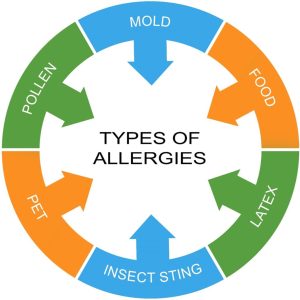Allergies are a common health condition affecting about 50 million individuals in the United States each year. The condition occurs in individuals of all ages.

Multiple types of allergies occur secondary to many different allergens, and individuals can have mild or severe symptoms or no symptoms. Several treatment and management protocols can be utilized for allergic conditions.
In what follows, we’ll be exploring the physiology of allergies and will define how they develop. We’ll also discuss the role that antibodies play and how particular treatment works to counteract the physiology of allergic reactions.
Allergies
An allergy is defined as an immune system reaction to a foreign intruder, such as pollen, fur, venom, mold, or food that doesn’t agree with your biology. This means that the foreign substance causes the body’s immune system to react and produce antibodies against the substance. The substance might not even be harmful, and it can still trigger the immune system to react. If this occurs, the substance is an allergen to the individual.
Through the stimulation of immune cells that then release chemicals to signal an unwelcomed intruder, allergenic substances ultimately cause a ripple effect of potential symptoms, ranging in severity from mild to severe and can be fatal.

Mild allergic signs and symptoms may include generalized itchiness, rashes, or congestion. Moderate allergic signs and symptoms may include intensified itch, shortness of breath, moderate swelling, or wheezing when breathing. Severe allergic signs and symptoms may include vomiting, confusion, low blood pressure, swelling of the airway that can lead to difficulty swallowing and life-threatening respiratory distress.
There are several types of allergies, including drug allergies, food allergies, pet allergies, pollen allergies, and insect allergies. Each of these substances can lead to symptoms that can be mild or severe, depending on the individual.
Causes of Allergies
Although the study of allergies and immunology has not conclusively identified why certain allergies occur, there is a level of certainty that there is a genetic component. In addition, though the development of allergic issues in a child of someone with specific allergies is not absolutely predictable, a higher likelihood of the allergic condition exists in these children. They may also be more likely than nonallergic individuals to develop allergies in their later years.
Autoimmune conditions in which the body develops antibodies against itself, such as Lupus or Rheumatoid Arthritis, may have a correlation with general allergic illness. Studies have also suggested that individuals who have allergic conditions have a higher risk of developing autoimmune conditions than the general population.
Though allergic reactions range in type, those that present a noticeable physical reaction, such as hives, which are the red welts on the skin, are the result of histamine release. During such a reaction, histamine is released from mast cells (a type of white blood cell) and causes symptoms such as hives and swelling.
The body’s response to a substance that it identifies as an allergen can be dramatic and rapid with the development of IgE antibodies. IgE antibodies are the type of antibodies produced by the immune system in response to an allergen. The body also has other blood cells that help defend against disease, infection, and allergens which are known as eosinophils.
Allergic reaction treatment and management options are readily available for any type of allergy, and the treatment is often timely and effective. These interventions can often be done without requiring an immediate visit to your medical provider in each incident.
Allergy Treatment and Management
The treatment and management options for allergic reactions often fall into the categories of oral medications, injectable medications, and immunotherapy. Some natural therapies can also be helpful as alternatives.
The following are the most common management options for different allergies:
Oral Medications
Depending on the allergy, oral medications are often utilized. Different medications can be utilized for the treatment of most mild allergies, such as antihistamines, corticosteroids, and decongestants. These medications can be useful as an allergy symptom reliever after the onset of symptoms or as a preventative medication.
Injectable Medication
Injectable medications are most often used in emergent situations, and an example of this type of medication is epinephrine. Epinephrine is a hormone and a neurotransmitter that causes vasoconstriction of the smooth muscle of blood vessels, and it also causes relaxation of the smooth muscle of the bronchial tubes in the lungs. These qualities help to counteract the complications that occur in a severe allergic reaction. Epinephrine can be administered through what’s most commonly known as an EpiPen.

Immunotherapy
Immunotherapy is a different treatment option that is utilized as a preventative measure for allergy management. In the process, an allergen substance is injected in a very small amount to induce a small allergic reaction.
Through the use of this method, the body is trained to handle small amounts of the particular allergen, and over time, the body adapts and will have a progressively improved response to the allergen.
Natural Remedies
While most natural remedies are only effective for the mildest of cases, the majority of them are easily implemented. Examples of natural remedies include herbal teas and certain essential oils.
Final Thoughts
Allergies can range from mild to very severe, and they can range from simply annoying symptoms to life-threatening emergencies.
Most allergies, however, are both treatable and manageable and, in some cases, can be prevented.
